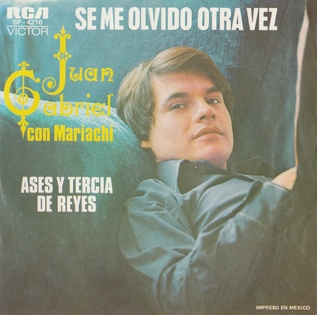
Luis Miguel Gallego Basteri is a Mexican singer and record producer. Born in Puerto Rico to an Italian mother and a Spanish father, he is often referred to as El Sol de Mexico, derived from the nickname his mother gave him as a child: "Mi sol". Luis Miguel has sung in multiple genres and styles, including pop songs, ballads, boleros, tangos, jazz, big band, and mariachi. Luis Miguel is also recognized as the only Latin singer of his generation not to cross over to the Anglo market during the "Latin Explosion" in the 1990s.

María Natalia Lafourcade Silva is a Mexican singer and songwriter who performs in genres such as pop rock, jazz, and folk music. Since her debut in 2002, she has been one of the most successful singers in Latin America and the United States. Lafourcade's voice has been categorized as a lyric soprano.

Vicente Fernández Gómez was a Mexican mariachi singer, actor and film producer. Nicknamed "Chente", "El Charro de Huentitán", "El Ídolo de México", and "El Rey de la Música Ranchera", Fernández started his career as a busker, and went on to become a cultural icon, having recorded more than 100 albums and contributing to more than 30 films. His repertoire consisted of rancheras and other Mexican classics such as waltzes.

María de los Ángeles de las Heras Ortiz, better known as Rocío Dúrcal, was a Spanish singer and actress with a career spanning more than four decades. She performed pop music, bolero, mariachi and romantic ballads and is widely regarded as one of the greatest Spanish singers of all time. Popular across Mexico and Latin America, she earned the sobriquet of Reina de las Rancheras.
Mexican pop is a music genre produced in Mexico, particularly intended for teenagers and young adults.

Paulina is the fifth studio album by Mexican singer Paulina Rubio. It was released on May 23, 2000 internationally by Universal Music México, being the first one with the label after departing from EMI México. Rubio worked with writers and producers such as Estéfano (mostly), Chris Rodríguez, Armando Manzanero, Juan Gabriel, Christian De Walden, and Richard Daniel Roman. The album explores a more variety sounds much different to the vein of her albums with EMI Music, and has an overall latin pop and dance-pop vibe, with influences from rock, ranchera, bolero, funk and house. Elaborating a "synthesis of the end of the millennium" theme for the album, Rubio reinvented her image.

YuridiaValenzuela Canseco, known mononymously as Yuri, is a Mexican singer, actress, and television host.

Natalia Altea Jiménez Sarmento is a Spanish singer-songwriter who started her musical career in the 2000s as vocalist of La Quinta Estación. Her first disc as a soloist was titled Natalia Jiménez. She has received Grammy and Latin Grammy Awards and has sold more than 3 million albums worldwide, during her solo career. She has recorded duets with the main stars of Latin music, including Marc Anthony, Daddy Yankee and Ricky Martin among others.
Cruz Martínez is an American record producer, songwriter and musician. He is a former member of the Tejano band La Sombra. In 1999, he joined the cumbia music group Los Kumbia Kings, created by A.B. Quintanilla. In 2007, he created the band Los Super Reyes. He is married to Alicia Villarreal.

"Se Me Olvidó Otra Vez" is a song written and performed by Mexican singer-songwriter Juan Gabriel for his fourth studio album, Juan Gabriel con el Mariachi Vargas de Tecalitlán (1974). The song is a ranchera number that tells of an awaited but impossible reunion as the singer forgets he is the only one who loved the woman. It was released as the lead single from the album in 1975. The song has been listed as among Juan Gabriel's best songs according to music critics and was one of the best-performing singles of 1975 in Mexico. Gabriel has re-recorded the song twice, the first for his compilation album, Por Los Siglos (2001), and as a duet with fellow Mexican singer-songwriter Marco Antonio Solís on his 28th studio album, Los Dúo (2015).

5to Piso is the eleventh studio album by Guatemalan singer-songwriter Ricardo Arjona, released on 18 November 2008. Produced by Arjona, Jorge Amaro, Dan Warner, Lee Levin, Fernando de Santiago and Puerto Rican singer-songwriter Tommy Torres, the album was recorded in various studios between the United States and Mexico. It is the first release by the artist under Warner Music. Arjona commented that with this album, he "tried to recoup some of the freshness" of his past releases, stating that "it makes good to the songs". Jason Birchmeier from Allmusic named it "an eagerly awaited album with a phenomenal lead single." 5to Piso marks the third album in which the singer collaborates with Tommy Torres, after Adentro and Quién Dijo Ayer.

Guillermina Jiménez Chabolla known professionally as Flor Silvestre, was a Mexican singer and actress. She was one of the most prominent and successful performers of Mexican and Latin American music, and was a star of classic Mexican films during the Golden Age of Mexican cinema. Her more than 70-year career included stage productions, radio programs, records, films, television programs, comics and rodeo shows.

Carla Patricia Morrison Flores is a Mexican indie-pop guitarist and singer. She has released three studio albums and has received various awards and nominations including two Grammy Award nominations and three Latin Grammy Awards.

Guadalupe Pineda Aguilar is a Mexican singer considered one of Mexico's grassroots musical icons. She is a recipient of the Latin Grammy Lifetime Achievement Award and a multi-Latin Grammy nominee, she has released more than 30 albums during her career covering various styles of music with sales over 14 million copies worldwide. In 1984, she recorded her breakthrough hit "Yolanda", also known as "Te Amo", composed by Pablo Milanes, selling more than 1.5 million copies. She primarily sings in Spanish, but has also sung in French, Italian, English, and Hebrew. She has been called the “Queen of Bolero”, but has also sung ballads, mariachi, tango, ranchera, and opera. Pineda has performed all over México, Latin America, and Spain, as well as in Europe and North America.
"Inolvidable" ("Unforgettable") is a song written by Julio Gutiérrez in 1944. It is considered one of the most popular boleros released during the Cuban musical movement led by pianists. The song has been recorded by several performers, including Roberto Carlos, Diego El Cigala, Fania All-Stars, Eydie Gormé, Danny Rivera, Tito Rodríguez and Bebo Valdés, among others.

Norma Monserrat Bustamante Laferte better known as Mon Laferte, is a Chilean and Mexican musician, singer, composer and painter. Her musical style is diverse, spanning across different genres such as pop, rock, bolero, cumbia, and salsa, showcasing her versatility and creativity. Throughout the 2010s, she gained widespread recognition for her melodramatic style and "captivating stage persona".
The 28th Lo Nuestro Awards ceremony, presented by the American network Univision, honoring the best Latin music of 2015 in the United States, took place on February 18, 2016, at the American Airlines Arena in Miami, Florida beginning at 5:00 p.m. PST. During the ceremony, Lo Nuestro Awards were presented in 26 categories. The ceremony was televised in the United States by Univision. Mexican actors Galilea Montijo and Arath de la Torre hosted the show.

Paula Arenas Álvarez is a Colombian pop singer-songwriter.

Eugenia León is a Mexican singer. In 1985, she won first place at the prestigious OTI Festival in Seville, Spain with the theme "El Fandango Aquí" by Marcial Alejandro. A recipient of the Latin Grammy Lifetime Achievement Award, she has had a career spanning more than 35 years and 26 recorded albums, of which several million copies have been sold. She has performed in some of the most important venues in Mexico, such as the Palacio de Bellas Artes, the Auditorio Nacional, the Sala Nezahualcóyotl, the Teatro de la Ciudad, and the Cervantino Festival.

Ángela Aguilar Álvarez Alcalá is a Mexican and American singer. She was born in Los Angeles while her mother was accompanying her father, Pepe Aguilar, on tour. Aguilar gained notable recognition after performing "La Llorona" at the 19th Annual Latin Grammy Awards in 2018. Her paternal grandparents are the actors and singers from the Golden Age of Mexican cinema, Antonio Aguilar and Flor Silvestre.
















